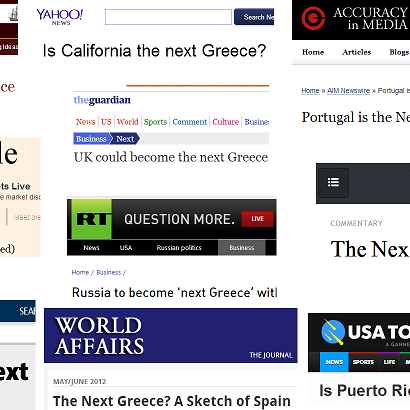I don't recall the exact year, but around the early 2000's I was in Athens' Syntagma Square and wanted to purchase a small bottle of sparkling mineral water from a kiosk. I asked the kiosk attendant if he stocked my preferred (Greek) brand of Souroti. He did not, and pointed out what they did carry – an Italian brand. As I went to pay, he added whimsically that “it's European”. To which I responded rhetorically: “isn't Souroti European?”
The attendant had inadvertently revealed his incorrect perception of Europe as something somehow separate from Greece-despite it being a member of the European Union (EU) since 1981. In similar fashion, there are many from other EU countries who may not see Greece as a separate entity per se, but perhaps as not quite European enough. The 1991 reference to Greece as Europe's “black sheep” by unnamed officials in Brussels is the most indicative and persistent such example.
With the advent of the European sovereign debt crisis, several tropes about Greece and Greeks have become all too common. Below are three of them and why they need to stop.
“The Next Greece”

News site headlines featuring the “next Greece” trope for various other locales.
This is an expression that is used frequently by media outlets, advocacy groups, and even once by a 2012 US presidential candidate (causing quite the stir in the Greek American community). The phrase seems to be used whenever a commentator wishes to sound the alarm about excessive spending that may lead to bankruptcy or a bailout. The term arose in the wake of the May 2010 Greek bailout, which was the largest international bailout in history, and the first time a developed country received IMF loans to stave off bankruptcy. Greece was the first eurozone country to require a bailout involving EU member states. Ireland, Portugal, Spain, and Cyprus would eventually follow.
Apart from the obvious fact that Greeks really don't need to be reminded of the woes that were triggered by the 2010 bailout, it also isn't a very good analogy in most cases since rarely do the economic woes of one country compare neatly to those of another. Ultimately, what this analogy boils down to is “you don't want to end up like them, do you?”. It reinforces the collective shaming of an entire populace, for what are often the crimes of a privileged few.
“Lazy Greeks”
“It is also important that people in countries like Greece, Spain and Portugal are not able to retire earlier than in Germany — that everyone exerts themselves more or less equally. That is important…We can't have a common currency where some get lots of vacation time and others very little. That won't work in the long term.” – Angela Merkel, May 17 2011 falsely claiming that Germans retire later than their southern European counterparts.
While not always explicitly stated, this trope is not uncommon. According to OECD statistics, for at least the past decade, Greece has consistently been near the top of the rankings for average annual hours actually worked per worker and no. 1 among European countries. There is a discussion to be had about how best to increase the productivity of the Greek economy, however it is simply incorrect to claim that a country's residents lack a work ethic when they are among the global leaders in time spent on the job. Furthermore, the term “lazy” is a slap in the face for the 1.37 million people actively looking for work (27.6% unemployment rate as of July 2013).
PIIGS

News site headlines that incorporate ‘PIIGS’ puns.
This acronym can be traced at least as far back as 1997 when its “PIGS” predecessor was reportedly used by northern Europeans to denote the four southern European countries Portugal Italy Greece Spain. Another “I” for Ireland was added later (or alternatively used to replace Italy) as the European sovereign debt crisis made it apparent that it would likely require EU assistance.
Even high ranking government officials have publicly objected to the term. In 2008, Portugal's finance minister Manuel Pinho said said “I am deeply offended that anyone would label my country with this term” in response to an FT article entitled “Pigs in muck”. As of February 2010, the term has been banned at FT and Barclays Capital in recognition of the obvious fact that assigning a derogatory label to countries that are struggling to recover from their worst recessions in recent memory may not be in the best of taste. Hopefully, other media outlets will follow suit.